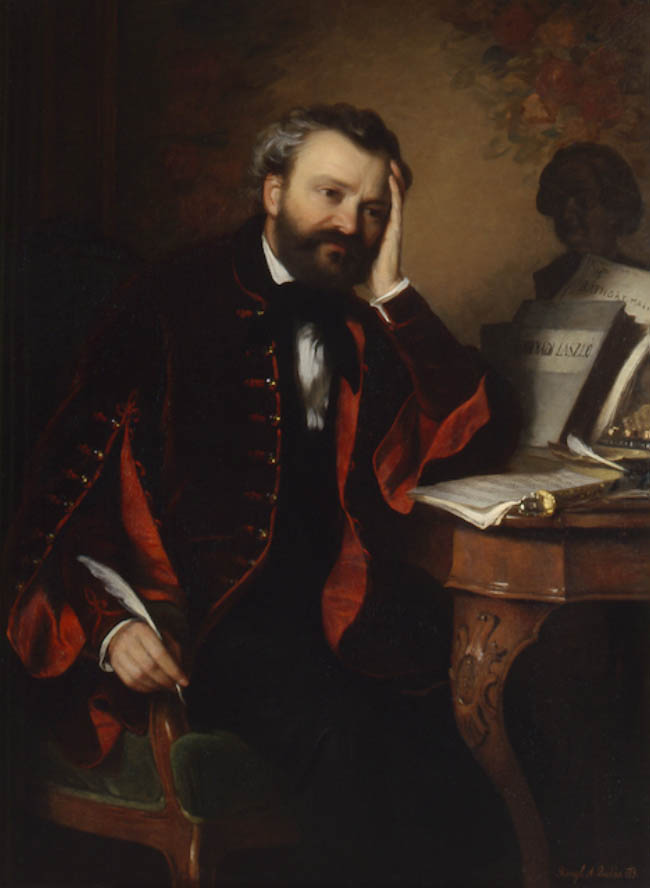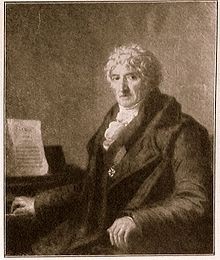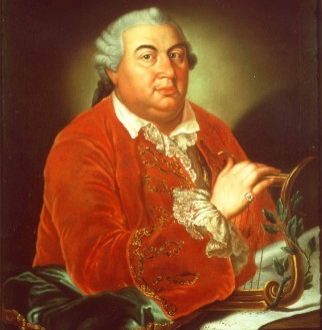
Ferenc Erkel |
Ferenc Erkel
Like Moniuszko in Poland or Smetana in the Czech Republic, Erkel is the founder of the Hungarian national opera. With his active musical and social activities, he contributed to the unprecedented flourishing of national culture.
Ferenc Erkel was born on November 7, 1810 in the city of Gyula, in the southeast of Hungary, into a family of musicians. His father, a German school teacher and church choir director, taught his son to play the piano himself. The boy showed outstanding musical abilities and was sent to Pozsony (Pressburg, now the capital of Slovakia, Bratislava). Here, under the guidance of Heinrich Klein (a friend of Beethoven), Erkel made unusually rapid progress and soon became known in music lovers circles. However, his father hoped to see him as an official, and Erkel had to endure the struggle with his family before fully devoting himself to an artistic career.
At the end of the 20s, he gave concerts in various cities of the country, and spent 1830-1837 in Kolozhvar, the capital of Transylvania, where he worked intensively as a pianist, teacher and conductor.
Staying in the capital of Transylvania contributed to the awakening of Erkel’s interest in folklore: “There, Hungarian music, which we neglected, sunk into my heart,” the composer later recalled, “so it filled my whole soul with a stream of the most beautiful songs of Hungary, and from them I was no longer able to free himself until he has poured out everything that, as it seemed to me, really should have poured out.
Erkel’s fame as a conductor during his years in Kolozsvár increased so much that in 1838 he was able to head the opera troupe of the newly opened National Theater in Pest. Erkel, having shown colossal energy and organizational talent, selected the artists himself, outlined the repertoire, and conducted rehearsals. Berlioz, who met him during a visit to Hungary, highly appreciated his conducting skills.
In the atmosphere of public upsurge before the revolution of 1848, Erkel’s patriotic works arose. One of the first was a piano fantasy on a Transylvanian folk theme, about which Erkel said that “with it our Hungarian music was born.” His “Hymn” (1845) to the words of Kölchey gained wide popularity. But Erkel focuses on the operatic genre. He found a sensitive collaborator in the person of Beni Egreshi, a writer and musician, on whose libretto he created his best operas.
The first of them, “Maria Bathory”, was written in a short time and in 1840 staged with resounding success. Critics enthusiastically welcomed the birth of the Hungarian opera, emphasizing the vividly national style of music. Inspired by success, Erkel composes a second opera, Laszlo Hunyadi (1844); her production under the direction of the author caused a stormy delight of the public. A year later, Erkel completed the overture, which was often performed in concerts. During his visit to Hungary in 1846, it was conducted by Liszt, who at the same time created a concert fantasy on the themes of the opera.
Having barely finished Laszlo Hunyadi, the composer set to work on his central work, the opera Bank Ban based on Katona’s drama. Her writing was interrupted by revolutionary events. But even the onset of reaction, police oppression and persecution did not force Erkel to abandon his plan. Nine years he had to wait for the production and, finally, in 1861, the premiere of Bank Ban took place on the stage of the National Theater, accompanied by patriotic demonstrations.
During these years, Erkel’s social activities are gaining momentum. In 1853 he organized the Philharmonic, in 1867 – the Singing Society. In 1875, an important event took place in the musical life of Budapest – after Liszt’s long troubles and energetic efforts, the Hungarian National Academy of Music was opened, which elected him honorary president, and Erkel – director. For fourteen years, the latter directed the Academy of Music and taught the piano class in it. Liszt praised Erkel’s public activities; he wrote: “For more than thirty years now, your works have adequately represented and advanced Hungarian music. Preserving it, preserving and developing it is the business of the Budapest Academy of Music. And its authority in this area and success in fulfilling all tasks is ensured by your sensitive care as its director.
Erkel’s three sons also try their hand at composition: in 1865, the comic opera Chobanets by Shandor Erkel was performed. Soon the sons begin to cooperate with their father and, as is assumed, all the operas of Ferenc Erkel after the “Bank-ban” (with the exception of the composer’s only comic opera “Charolta”, written in 1862 to an unsuccessful libretto – the king and his knight achieve the love of the village cantor’s daughter) are the fruit of such cooperation (“György Dozsa”, 1867, “György Brankovich”, 1874, “Nameless Heroes”, 1880, “King Istvan”, 1884). Despite their inherent ideological and artistic merits, the unevenness of style made these works less popular than their predecessors.
In 1888, Budapest solemnly celebrated the fiftieth anniversary of Erkel’s activity as an opera conductor. (By this time (1884) the new building of the opera house was opened, the construction of which lasted nine years; funds, as in their time in Prague, were collected throughout the country by subscription.). In a festive atmosphere, the performance of “Laszlo Hunyadi” under the direction of the author took place. Two years later, Erkel appeared to the public for the last time as a pianist – at the celebration of his eightieth birthday, he performed Mozart’s d-moll concerto, the performance of which he was famous for in his youth.
Erkel died on June 15, 1893. Three years later, a monument was erected to him in the composer’s hometown.
M. Druskin
Compositions:
operas (all set in Budapest) – “Maria Bathory”, libretto by Egresi (1840), “Laszlo Hunyadi”, libretto by Egresi (1844), “Bank-ban”, libretto by Egresi (1861), “Charolte”, libretto by Tsanyuga (1862) , “György Dozsa”, libretto by Szigligeti based on the drama by Yokai (1867), “György Brankovich”, libretto by Ormai and Audrey based on the drama by Obernik (1874), “Nameless Heroes”, libretto by Thoth (1880), “King Istvan”, libretto by Varadi Dobshi’s drama (1885); for orchestra – Solemn Overture (1887; to the 50th anniversary of the National Theater of Budapest), Brilliant duet in fantasy form for violin and piano (1837); pieces for piano, including Rakotsi-marsh; choral compositions, including a cantata, as well as a hymn (to lyrics by F. Kölchei, 1844; became the anthem of the Hungarian People’s Republic); songs; music for drama theater performances.
Erkel’s sons:
Gyula Erkel (4 VII 1842, Pest – 22 III 1909, Budapest) – composer, violinist and conductor. He played in the orchestra of the National Theater (1856-60), was its conductor (1863-89), professor at the Academy of Music (1880), founder of the music school in Ujpest (1891). Elek Erkel (XI 2, 1843, Pest – June 10, 1893, Budapest) – author of several operettas, including “The Student from Kasshi” (“Der Student von Kassau”). Laszlo Erkel (9 IV 1844, Pest – 3 XII 1896, Bratislava) – choir conductor and piano teacher. Since 1870 he worked in Bratislava. Sandor Erkel (2 I 1846, Pest – 14 X 1900, Bekeschsaba) – choir conductor, composer and violinist. He played in the orchestra of the National Theater (1861-74), since 1874 he was a choral conductor, since 1875 he was the chief conductor of the National Theater, director of the Philharmonic. Author of the Singspiel (1865), the Hungarian Overture and male choirs.
References: Aleksandrova V., F. Erkel, “SM”, 1960, No 11; Laszlo J., Life of F. Erkel in illustrations, Budapest, 1964; Sabolci B., History of Hungarian Music, Budapest, 1964, p. 71-73; Maroti J., Erkel’s path from heroic-lyrical opera to critical realism, in the book: Music of Hungary, M., 1968, p. 111-28; Nemeth A., Ferenc Erkel, L., 1980.





